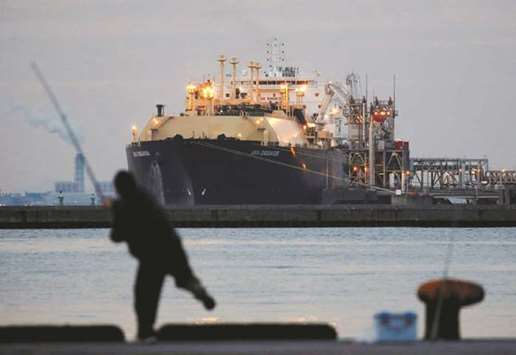The global natural gas business may be facing some tough times ahead.
That was the warning that Nordine Ait-Laoussine, Algeria’s former energy minister, issued at the second big gas conference in Europe last week. During the meetings, industry executives spoke of a bright future for the fuel thanks to booming liquefied natural gas supply and a move away from coal.
Natural gas demand growth is set to outpace both oil and coal over the coming years, leading producers to pitch the fuel as a bridge between a fossil-fuel past and a carbon-free future. However, too little attention is being paid to the rapid decline in the cost of renewables and fading government support for fossil fuels, according to Ait-Laoussine. “This dramatic growth of renewable power generation should make perhaps the gas industry more humble,” he said at a gas and power summit in Paris on Thursday. “It’s being taken for granted it will grow forever.”
The conferences tended to focus on more immediate developments, from Iran’s rising production over disputes between the US and Russia to when a supposed wave of LNG is actually going to hit the market.
And then there was Nord Stream 2, one of the world’s more controversial energy projects. The pipeline from Russia to Germany under the Baltic Sea has split Europe, with opponents arguing it threatens the status of Ukraine as a key gas transit nation, and the billions of revenue that entails, even as it fights Kremlin-backed supporters in its East.
The link has also faced criticism from outside Europe, being specifically targeted in a US sanctions law earlier this year. Nord Stream 2 is needed to help fuel Europe’s energy transition, according to owner Gazprom, the Russian state- controlled company that supplies about a third of Europe’s natural gas.
At a conference in Milan on November 7, Russell Roth, a Department of Energy adviser working at the US European Command in Stuttgart, Germany, reiterated American opposition to Nord Stream 2 and said those reservations pre-dated the rise in US shale gas production and ensuing liquefied natural gas exports that compete with Russia. He said his comments were about helping European allies with energy security.
“We have seen, and many people in this room experienced this firsthand, the risk that comes from reliance on a single source of natural gas,’’ Roth said. “Energy supply is used as a geopolitical tool, or weapon.’’
Alex Barnes, a government relations adviser at Nord Stream 2 who was previously head of regulatory affairs at Gazprom Marketing and Trading, said later in an interview that US claims about the pipeline creating problems were “completely bogus.’’
“What we’re doing is just competing in a normal, economic way,’’ he said. “If they understood how the market really worked, they wouldn’t be opposing it.’’
Other noteworthy topics at the conferences were:
n LNG may be traded more and more, but markets are still regional, according to Gazprom Export head Elena Burmistrova. European and Asian gas markets “lead separate lives,’’ she said. Others might disagree.
n Iran wants to be a powerhouse. It aims to attract $200bn for its energy sector between 2018 and 2028 and add 115bn cubic meters a year of gas production, the equivalent of Japan’s annual demand.
n Italy is still pushing the idea that it can be the centre of the southern European gas market. The commercial director of the Trans-Adriatic Pipeline that will bring fuel from the Caspian Sea into Italy, said 58% of the project has been built.
n Blockchain. While there was some interest in how the technology could save costs by cutting brokers out of gas trades, delegates expressed scepticism during a presentation by Italy’s state-owned Enel on how much of the market it would capture.

A liquefied natural gas (LNG) tanker is moored at a power station in Futtsu, east of Tokyo (file). Natural gas demand growth is set to outpace both oil and coal over the coming years, leading producers to pitch the fuel as a bridge between a fossil-fuel past and a carbon-free future.
